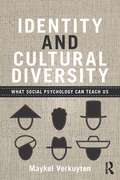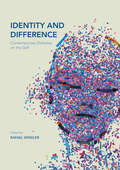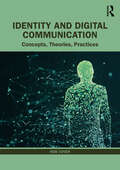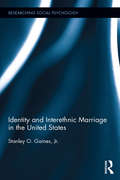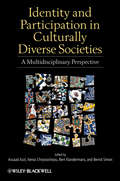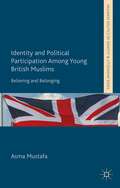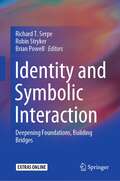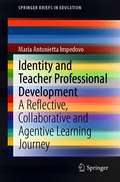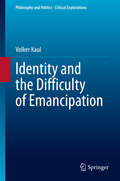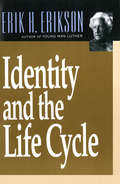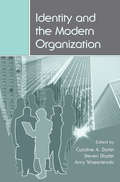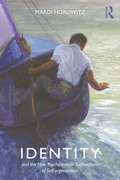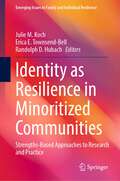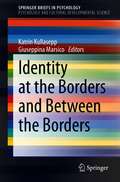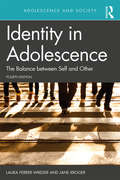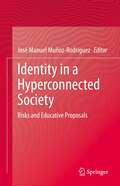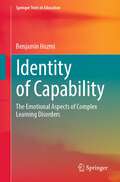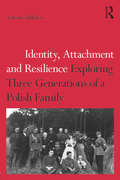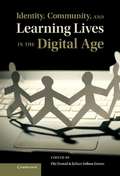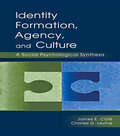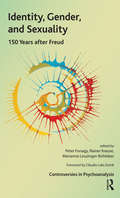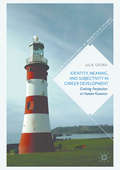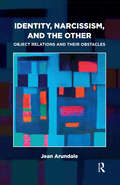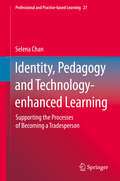- Table View
- List View
Identity and Cultural Diversity: What social psychology can teach us
by Maykel VerkuytenIdentity and Cultural Diversity examines immigration and its effect on diversity from a social psychological perspective. Immigration increases cultural diversity and raises difficult questions of belonging, adaptation, and the unity of societies: questions of identity may be felt by people struggling with the basic problem of who they are and where they fit in, and although cultural diversity can enrich communities and societies it also sometimes leads to a new tribalism, which threatens democracy and social cohesion. The author Maykel Verkuyten considers how people give meaning to the fact that they belong to ethnic, racial, religious and national groups, and the implications this can have for social cohesion. The opening chapters consider the nature of social identity and group identification, and include discussions of identity development in adolescence, acculturation, and multiple and dual identities. Verkuyten then considers one of the most pernicious social problems: how conflict emerges from perceiving others as different. He examines when and why group distinctions grow into conflicts and considers the role of cultural diversity beliefs, such as multiculturalism and assimilation. The book concludes by exploring productive ways of managing cultural diversity. Written in an engaging style, Identity and Cultural Diversity will be essential reading for undergraduate and postgraduate students of social and cultural psychology and other social sciences, and it also makes key themes in social psychology accessible to a wider audience outside academia.
Identity and Difference: Contemporary Debates on the Self
by Rafael WinklerThis book provides a persuasive account of how identity and difference factor in the debate on the self in the humanities. It explores this topic by applying the question to fields such as philosophy, cultural studies, politics and race studies. Key themes discussed in this collection include authenticity in Michel de Montaigne’s essays, the limits of the narrative constitution of the self, the use and abuse of the notion of human nature in political theory and in the current political context of multiculturalism, and the feminist notion of the erotic and of sexual violence. This book will appeal to readers with an interest in new perspectives on the self within the humanities.
Identity and Digital Communication: Concepts, Theories, Practices
by Rob CoverThis comprehensive text explores the relationship between identity, subjectivity and digital communication, providing a strong starting point for understanding how fast-changing communication technologies, platforms, applications and practices have an impact on how we perceive ourselves, others, relationships and bodies. Drawing on critical studies of identity, behaviour and representation, Identity and Digital Communication demonstrates how identity is shaped and understood in the context of significant and ongoing shifts in online communication. Chapters cover a range of topics including advances in social networking, the development of deepfake videos, intimacies of everyday communication, the emergence of cultures based on algorithms, the authenticities of TikTok and online communication’s setting as a site for hostility and hate speech. Throughout the text, author Rob Cover shows how the formation and curation of self-identity is increasingly performed and engaged with through digital cultural practices, affirming that these practices must be understood if we are to make sense of identity in the 2020s and beyond. Featuring critical accounts, everyday examples and analysis of key platforms such as TikTok, this textbook is an essential primer for scholars and students in media studies, psychology, cultural studies, sociology, anthropology, computer science, as well as health practitioners, mental health advocates and community members.
Identity and Interethnic Marriage in the United States (Researching Social Psychology)
by Stanley O. Gaines, Jr.Drawing on psychological and sociological perspectives as well as quantitative and qualitative data, Identity and Interethnic Marriage in the United States considers the ways the self and social identity are linked to the dynamics of interethnic marriage. Bringing together the classic theoretical contributions of George Herbert Mead, Erving Goffman, and Erik Erikson with contemporary research on ethnic identity inspired by Jean Phinney, this book argues that the self and social identity—especially ethnic identity—are reflected in individuals’ complex journey from singlehood to interethnic marriage within the United States.
Identity and Participation in Culturally Diverse Societies
by Assaad E. Azzi Bernd Simon Xenia Chryssochoou Bert KlandermansIdentity and Participation in Culturally Diverse Societies presents an original discussion in an edited volume of how the links between identity, political participation, radicalization, and integration can provide a scientific understanding of the complex issue of coexistence between groups in culturally diverse societies.Offers a scientific understanding of the complex issue of coexistence between groups in culturally diverse societiesUtilizes original theory which combines social psychology, sociology, and political scienceIncludes an original and extensive discussion of combining the concepts of identity and diversityInnovatively and engagingly employs the latest research and state-of-the-art theory
Identity and Political Participation Among Young British Muslims
by Anthony Heath Asma MustafaThis book tackles unanswered questions on British Muslims and political participation: What makes religion a salient 'political' identity for young Muslims (over any other identity)? How do young British Muslims identify themselves and how does it relate to their political engagement? A fascinating insight into the lives of young British Muslims.
Identity and Symbolic Interaction: Deepening Foundations, Building Bridges
by Brian Powell Robin Stryker Richard T. SerpeThis book examines identity theory’s centrality within social psychology and its foundations within structural symbolic interaction, highlighting its links not only to other prominent sociological subfields, but also to other theoretical perspectives within and beyond sociology. The book provides a synthetic overview outlining the intellectual lineage of identity theory within structural symbolic interactionism, and how the “Indiana School” of identity theory and research, associated especially with Sheldon Stryker, relates to other symbolic interactionist traditions within sociology. It also analyses the latest developments in response to the push to integrate identity theory, which initially focused on role identities, with the study of personal, group and social identities. Further, it discusses the relationship between identity theory and affect control theory, providing a sense of the many substantive topics within sociology beyond social psychology for which the study of identity has important, sometimes underappreciated implications. The book concludes with a chapter summarizing the interrelated lessons learned while also reflecting on remaining key questions and challenges for the future development of identity theory.
Identity and Teacher Professional Development: A Reflective, Collaborative and Agentive Learning Journey (SpringerBriefs in Education)
by Maria Antonietta ImpedovoThis book addressed teachers’ necessity to be able to respond to the new needs and demands caused by an ever-evolving educational system, as recognized in the national and international policy and research literature. The book proposes an analysis of the features that shape the journey of the teacher profession and professionalism, a journey which needs to be collaborative, agentive and dialogical: • Collaborative in changing the personal and professional teacher development from an individual and solitude process toward a joint discovery with mutual enrichment and shared directionality; • Agentive in the ability to activate internal and external resources for an individual, productive and communicative transformation; • Dialogical in the ability to enrich the personal narrative with the voices of others and opening spaces for dialogue and listening. The seven chapters are structured in a way that gives flow and pace to the unfolding story of the developing teacher identity and is informed by a whole range of research and literature. This book serves as a reference point for teacher-students, in-service teachers and teacher educators who are interested in their professional development and looking for new perspectives. It also offers some helpful insights for administrators who need to make ICT decisions on course development in teacher education.
Identity and the Difficulty of Emancipation (Philosophy and Politics - Critical Explorations #13)
by Volker KaulThis book provides a comprehensive account of the phenomenon of identity in politics, featuring for the first time the question of individual emancipation. It addresses the burning questions of our times, viz. nationalism, populism, Islamic fundamentalism, multiculturalism, postsecularism and postcolonialism. The volume repudiates an easy reconciliation between identity and emancipation, such as it occurs in contemporary liberal and multicultural political theories. It shows that we cannot achieve emancipation without Kant’s help, whereas identity relentlessly draws us back to collective values and the community. The book urges for a new understanding of identity and a politics that instead of accommodating identities seeks to govern them. Identity is the buzzword in the humanities and social sciences, but also the most contentious and least conceptualized term. This book intends to bring theoretical clarity into the debate on how identity plays out in politics.
Identity and the Life Cycle
by Erik H. EriksonErik H. Erikson's remarkable insights into the relationship of life history and history began with observations on a central stage of life: identity development in adolescence. This book collects three early papers that--along with Childhood and Society--many consider the best introduction to Erikson's theories. "Ego Development and Historical Change" is a selection of extensive notes in which Erikson first undertook to relate to each other observations on groups studied on field trips and on children studied longitudinally and clinically. These notes are representative of the source material used for Childhood and Society. "Growth and Crises of the Health Personality" takes Erikson beyond adolescence, into the critical stages of the whole life cycle. In the third and last essay, Erikson deals with "The Problem of Ego Identity" successively from biographical, clinical, and social points of view--all dimensions later pursued separately in his work.
Identity and the Modern Organization (Series In Organization And Management Ser.)
by Caroline A. Bartel Steven L. Blader Amy WrzesniewskiIdentity and the Modern Organization presents a lively exchange of ideas among psychology and management scholars on the realities of modern organizational life and their effect on the identities that organizations and their members cultivate. This book bridges the domains of psychology and management to facilitate a multi-disciplinary, multi-level
Identity and the New Psychoanalytic Explorations of Self-organization (Psychological Issues)
by Mardi HorowitzAdvances in science and the humanities have demonstrated the complexity of psychological, social and neurological factors influencing identity. A contemporary discourse is needed to anchor the concepts required in speaking about identity in present day understanding. In Identity and the New Psychoanalytic Explorations of Self-organization, Mardi Horowitz offers new ways of speaking about parts of self, explaining what causes a range of experiences from solidity in grounding the self to disturbances in a sense of identity. The book covers many aspects of both the formation and the deconstruction of identity. Horowitz examines themes including: -The sense of identity -Social learning -Biological learning -Identity and self-esteem - Levels of personality functioning and growth The book clarifies basic questions, defines useful terms, examines typical identity disturbances and presents a biopsychosocial theory which indicates how schemas operate in conscious and unconscious mental processing. The answers to the basic questions lead to improvements in psychotherapy practices as well as teaching and research methods. Identity and the New Psychoanalytic Explorations of Self-organization will prove fascinating reading for those working in the fields of psychoanalysis, psychology, psychiatry, neuroscience and the social disciplines.
Identity as Resilience in Minoritized Communities: Strengths-Based Approaches to Research and Practice (Emerging Issues in Family and Individual Resilience)
by Julie M. Koch Erica E. Townsend-Bell Randolph D. HubachThis book examines strengths-based approaches to understanding and celebrating diverse populations. It centers on understanding the ways in which minoritized group identities and membership in such communities can serve as sources of strength. The volume explores the varied dimensions of minoritized identities and challenges traditional concepts of what it means to be resilient. It presents research-based and innovative strategies to understand more thoroughly the role of resilience and strengths in diverse populations and families. The book addresses the need to consider affirmative, liberation, and strengths-based models of resilience.Key areas of coverage include:Families of transgender and gender diverse people.The role of chosen family in LGBTQ communities.Latinx LGBTQ families.The Indian Child Welfare Act.Celebration of Black girl voices.Homeschooling as a resilience factor for Black families.Black identity and resilience related to mental health.Black resilience in families.Identity as Resilience in Minoritized Communities is a must-have resource for researchers, professors, and graduate students as well as clinicians and related professionals in developmental psychology, family studies, clinical child and school psychology, cultural psychology, social work, and public health as well as education policy and politics, behavioral health, psychiatry, and all related disciplines.
Identity at the Borders and Between the Borders (SpringerBriefs in Psychology)
by Giuseppina Marsico Katrin KullaseppWithin the general framework of Cultural Psychology, this book provides different perspectives on the relationship between border and identity by experts from several disciplines (i.e. history, psychology, geography etc.). The book offers an “in- depth” comprehension of the intricacy of the border making process and how this affect the identity formation from a psychological, social and cultural point of views. The book takes a close look to some European countries as specimens to investigate the complex link between creation of national/ethnic identity and bordering process that evoke the more general question of the I-OTHER relation.This book provides an integrated insight into the complex phenomenon of borders and identity. The process of making and negotiating border and the identity formation on the border is analyzed as psychological, social, historical, and cultural phenomena.This Brief will be of interest to researchers and students as well as diplomats and administrative policy makers within the fields of political science, psychology, cultural psychology, and sociology.
Identity in Adolescence 4e: The Balance between Self and Other (Adolescence and Society)
by Laura Ferrer-Wreder Jane KrogerThis fully revised fourth edition of Identity in Adolescence: The Balance Between Self and Other presents four theoretical perspectives on identity development during adolescence and young adulthood and their practical implications for intervention. Ferrer-Wreder and Kroger consider adolescent identity development as the unique intersection of social and cultural forces in combination with individual factors that each theoretical model stresses in attempting to understand the identity formation process for contemporary adolescents. Identity in Adolescence addresses the complex question of how adolescent identity forms and develops during adolescence and young adulthood and serves as the foundation for entering adult life. The book is unique in its presentation of four selected models that address this process, along with cutting-edge research and the implications that each of these models hold for practical interventions. This new edition has been comprehensively revised, with five completely new chapters and three that have been extensively updated. New special topics are also addressed, including ethnic, sexual, and gender identity development, the role of technology in adolescent identity development, and ongoing identity development beyond adolescence. The book is essential reading for advanced undergraduate and graduate students studying adolescent development, self and social identity within developmental psychology, social psychology and clinical psychology, as well as practitioners in the fields of child welfare and mental health services, social work, youth and community work and counselling.
Identity in a Hyperconnected Society: Risks and Educative Proposals
by José Manuel Muñoz-RodríguezThis book is about the formation of identity, primarily in adolescents, and the danger inherent in creating that identity in the context of a hyperconnected world. It provides scientific and regulatory pedagogical knowledge associated with these risks in creating identity, primarily among young people, arising from increasing, and increasingly important, screen connection times. It proposes solutions to the educational challenges of constructing identity in a hyperconnected society. The book focuses especially on the process of identity formation in this instance, where both adolescents and the adults who teach them have forgotten the vital need to incorporate educational theories and principles, novel, experimental and basic, kn any discussion of adolescent identity work.
Identity of Capability: The Emotional Aspects of Complex Learning Disorders (Springer Texts in Education)
by Benjamin HozmiThis textbook focuses upon understanding the importance of building an identity of capability as a means of growth, giving, and living a rich and satisfying personal and interpersonal life for people with complex learning disorders. Through this book, teachers will gain a greater understanding of the emotional world of these students and will be able to ‘tune in’ and build trust. The volume presents tools for facilitating ‘empowered teaching’ which supports teachers to create a learning climate that will enable students with complex learning disorders to build trust, gain understanding, and promote development. Establishing an identity of capability will enable students in general, and adults with complex learning disabilities in particular, to identify their true strongpoints, to conceptualize them, and to place them at the forefront of their self-image. The text provides many lively examples for empowering teaching and for implementing the principles of intervention and teaching to students with complex learning disorders as presented in the book. It offers a revision of the teacher’s role and tools for creating an accepting climate within the class that will enhance learning processes.
Identity, Attachment and Resilience: Exploring Three Generations of a Polish Family
by Antonia BifulcoIdentity, Attachment and Resilience provides a timely foray into the new field of psychology and genealogy, exploring the relationship between family history and identity. The field encompasses family narratives and researches family history to increase our understanding of cultural and personal identity, as well as our sense of self. It draws on emotional geography and history to provide rich yet personalised contexts for family experience. In this book, Antonia Bifulco researches three generations of her own Czechowski family, beginning in Poland in the late nineteenth century and moving on to post-WWII England. She focuses on key family members and places to describe individual experience against the socio-political backdrop of both World Wars. Utilising letters, journals and handwritten biographies of family members, the book undertakes an analysis of impacts on identity (sense of self ), attachment (family ties) and resilience (coping under adversity), drawing out timely wider themes of immigration and European identity. Representing a novel approach for psychologists, linking family narrative to social context and intergenerational impacts, Identity, Attachment and Resilience describes Eastern European upheaval over the twentieth century to explain why Polish communities have settled in England. With particular relevance for Polish families seeking to understand their cultural heritage and identity, this unique account will be of great interest to any reader interested in family narratives, immigration and identity. It will appeal to students and researchers of psychology, history and social sciences.
Identity, Community, and Learning Lives in the Digital Age
by Julian Sefton-Green Ola ErstadRecent work on education, identity and community has expanded the intellectual boundaries of learning research. From home-based studies examining youth experiences with technology, to forms of entrepreneurial learning in informal settings, to communities of participation in the workplace, family, community, trade union and school, research has attempted to describe and theorize the meaning and nature of learning. Identity, Community, and Learning Lives in the Digital Age offers a systematic reflection on these studies, exploring how learning can be characterized across a range of 'whole-life' experiences. The volume brings together hitherto discrete and competing scholarly traditions: sociocultural analyses of learning, ethnographic literacy research, geo-spatial location studies, discourse analysis, comparative anthropological studies of education research and actor network theory. The contributions are united through a focus on the ways in which learning shapes lives in a digital age.
Identity, Formation, Agency, and Culture: A Social Psychological Synthesis
by James E. Cote Charles G. LevineThe goal of Identity, Formation, Agency, and Culture is to lay the basis of a theory with which to better understand the difficulties and complexities of identity formation. It provides an extensive understanding of identity formation as it relates to human striving (agency) and social organization (culture). James E. Côté and Charles G. Levine have compiled state-of-the-art psychological and sociological theory and research into a concise synthesis. This volume utilizes a vast, interdisciplinary literature in a reader-friendly style. Playing the role of narrators, the authors take readers through the most important theories and studies of self and identity, focusing on pragmatic issues of identity formation--those things that matter most in people's lives. Identity, Formation, Agency, and Culture is intended for identity-related researchers in the behavioral and social sciences, as well as clinicians, counselors, and social workers dealing with identity-related disorders. It also serves as a main or supplemental text in advanced courses on identity, identity and human development, social development, moral development, personality, the sociology of identity, and the individual and society taught in departments of psychology, sociology, human development, and family studies.
Identity, Gender, and Sexuality: 150 Years After Freud (The International Psychoanalytical Association Controversies in Psychoanalysis Series)
by Peter Fonagy Marianne Leuzinger-Bohleber Rainer Krause'While Freud opened the door on the formative and motivating power of sexuality, contemporary psychoanalysts, with some notable exceptions, have consigned sexuality to the psychoanalytic closet. This book not only re-opens the door on the broad subject of psychosexuality, but also provides fresh insights into heterosexuality, bisexuality, homosexuality, gender identity disorder, transvestism and transsexualism. This publication brings together some of the leading psychoanalytic authorities from around the globe to consider in depth the complex interweaving of identity, gender and sexuality from theoretical, clinical, historical and research perspectives. The author strongly recommends "Identity, Gender and Sexuality" to those looking for a book that does not pull punches. The reader will find a debate about the relative merits of clinical, empirical, and conceptual research, critical assessments of interdisciplinary findings from infant and child development research, embodied cognitive science, academic psychology, neurobiology, genetics, ethology, and other fields of inquiry, and honest and illuminating psychoanalytic case studies. - Donald Campbell
Identity, Health and Women
by Jacqueline Ann ChristodoulouThis book provides a three-part investigation into identity construction. Theory, voice and praxis are all represented as the book follows the rationale, stories and narrative methodology of the study of a group of women. The final part of the book presents a new model of identity construction framed in women's health identity.
Identity, Meaning, and Subjectivity in Career Development
by Julie GedroThis book closely interrogates the construct of identity and the role it plays in career development. It provides guidance for HRD practitioners and researchers who create career development programs through a typology of different categories of identity, such as demographics, life events, and career histories. The book presents a framework for considering and addressing career development from a critically reflective perspective of identity as a result of choice, chance, and adaptation. It offers a comprehensive understanding and awareness of tacit, nuanced, and stigmatized issues that were once shameful but have now become more socially acceptable. As a result, HRD practitioners can design programs and resources that have a richness and relevance that might heretofore be lacking. The book also offers guidance for individuals as they take charge of their own identities and career trajectories in an increasingly complex and unpredictable working environment.
Identity, Narcissism, and the Other: Object Relations and their Obstacles
by Jean ArundalePractitioners of psychoanalysis find three central themes to be recurrent and ubiquitous in every analysis; firstly, issues around identity, the struggle to know the self, to understand the self and to be the self in an authentic way. Intricately entangled with self-identity is the problem of narcissism, essentially viewed as a defensive retreat to a mental state characterized by an unconscious belief in the special value of the self and the diminution of the Other. However, there are a multitude of inherent anxieties involved in close and intimate relationships. As Freud pointed out, even in our most intimate relationships there is an element of hostility. Threats to both the self and other, and various anxieties around libidinal contact, will be examined in this book using case material, and the relationship between these three important themes, identity, narcissism and the other, separate but interconnected, will be explored.
Identity, Pedagogy and Technology-enhanced Learning: Supporting the Processes of Becoming a Tradesperson (Professional and Practice-based Learning #27)
by Selena ChanThis book gathers work from over a decade of study, and seeks to better understand and support how learners become tradespeople. The research programme applies recent concepts from neuroscience, educational psychology and technology-enhanced learning to explain and help overcome the challenges of learning in trades-learning contexts. Due to the complex and multifarious nature of the work characterising trade occupations, learning how to become a tradesperson requires a significant commitment in terms of time, along with physical and cognitive effort. All modalities (visual, aural, haptic etc.) and literacies (text, numerical, spatial etc.) are required when undertaking trade work. Manual dexterity and strength, coupled with the technical and tacit knowledge required for complex problem solving, not to mention suitable dispositional approaches, must all be learnt and focused on becoming a tradesperson.However, there is a substantial gap in the literature on 'how people learn a trade' and 'how to teach a trade'. In this book, contemporary teaching and learning approaches and strategies, as derived through practice-based participatory research, are used to highlight and discuss pragmatic solutions to facilitate the learning and teaching of trade skills, knowledge and dispositions. The approaches and strategies discussed include the implementation of technology-enhanced learning; project-based inquiry/problem-based learning; and recommendations to ensure learners are prepared for the future of work.
